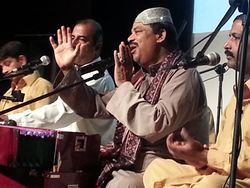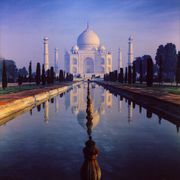قوالي

| قوالي | |
|---|---|
| الأصول النمطية | موسيقى تقليدية فارسية وفي شبه القارة الهندية |
| الأصول الثقافية | الهند في القرن 13 ميلادي |
| الآلات التقليدية | vocals, harmonium, طبلة، dholak, sarangi, تصفيق |
| موضوعات أخرى | |
| اللغة: اوردو | |
| الصوفية |
|---|
 |
|
|
قوالي (نستعليق: قوّالی; گرمكهي: ਕਵਾਲੀ ؛ ديڤانگري: क़व्वाली ؛ نگري شرقي: ক়ব্বালী؛ إنگليزية: Qawwali) هو صيغة من الموسيقى الدينية الصوفية الشائعة في جنوب آسيا، خصوصاً في إقليمي پنجاب والسند في پاكستان و حيدر آباد، دلهي وأجزاء أخرى من الهند. وهو تقليد موسيقي يمتد إلى أكثر من 700 سنة.
ويُؤدى هذا الفن في الأضرحة الصوفية أو درگاه في أرجاء جنوب آسيا، وقد اكتسبت أيضًا شعبية كبيرة. حصلت موسيقى القوالي على شهرة دولية من خلال أعمال المغني الپاكستاني الراحل نصرت فاتح علي خان، ويرجع ذلك إلى حد كبير إلى العديد من الإصدارات من Real World ، وتلاها الحفلات الحية WOMAD. ومن بين مغني القوالي المشهورين في باكستان نجد الأخوان صبري وبهاء الدين قطب الدين و عزيز ميان.
الأصول
المحتوى الغنائي
قالب:Indianmusic قالب:Pakistanimusic
 جزء من سلسلة عن |
|---|
| العمارة |
|
العربية • الهندية الإسلامية • إيوان |
| الفن |
| الرقص |
| الزي |
|
سلوار قميص • طاقية • عقال |
| العطلات |
|
عيد الفطر • عيد الأضحى |
| الأدب |
|
العربي • الفارسي • التركي |
| الموسيقى |
| المسرح |
إنشادات القوالي تُصنف حسب محتواهم إلى الأقسام التالية:
- حمد، is a song in praise of Allah. Traditionally, a qawwali performance starts with a hamd.
- نعت، is a song in praise of the Prophet Muhammad. The opening hamd is traditionally followed by a naat.
- مناقب، is a song in praise of either Imam Ali or one of the Sufi saints. Manaqib in praise of Ali are sung at both Sunni and Shi'a gatherings. If one is sung, it will follow right after the naat. There is usually at least one manqabat in a traditional programme.
- مرثية، is a lamentation over the death of much of Imam Husayn's family in the Battle of Karbala. This would typically be sung only at a Shi'a concert.
- غزل، is a song that sounds secular on the face of it. There are two extended metaphors that run through ghazals—the joys of drinking and the agony of separation from the beloved. These songs feature exquisite poetry, and can certainly be taken at face value, and enjoyed at that level.[1] In fact, in Pakistan and India, ghazal is also a separate, distinct musical genre in which many of the same songs are performed in a different musical style, and in a secular context.
قوالو الماضي
- عزيز ميان
- بدر علي خان, الشهير ببدر ميانداد
- بهاء الدين قطب الدين
- فاتح علي خان
- مبارك علي خان
- منشي رضي الدين
- نصرت فاتح علي خان
- الأخوان صبري
القوالون الحاليون
- فيض علي فيض
- فريد عياذ
- رضوان معظم قوالي
- راحت نصرت فاتح علي خان
- Waheed and Naveed Chishti
- Warsi Brothers
طالع أيضاً
الهامش
- ^ Manuel, Peter Lamarche (1993). Cassette culture: popular music and technology in north India. U of Chicago P. p. 124. ISBN 978-0-226-50401-8. Retrieved 3 April 2010.
وصلات خارجية
- BBC Radio 3 Audio (45 minutes): The Nizamuddin shrine in Delhi. Accessed November 25, 2010.
- BBC Radio 3 Audio (45 minutes): A mahfil Sufi gathering in Karachi. Accessed November 25, 2010.
- Origin and History of the Qawwali, Adam Nayyar, Lok Virsa Research Centre, Islamabad. 1988.
- QAWWALI PAGE Islamic Devotional Music by David Courtney, Ph.D.
- Documentary: Music of Pakistan (52 min.)
